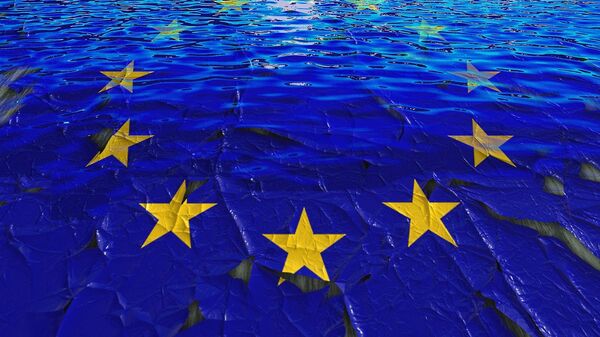The umpteenth research into the level of taxes paid by big corporations in Europe was introduced in the parliament on Tuesday. It represents the result of the analysis of the 2011-2016 Orbis database, assessing the differential between the legal tax obligations of countries and the actual amount of tax paid. The research predictably revealed that big corporations are only paying a fraction of what they are supposed to pay in statutory taxation throughout the union.
The European Union indeed has never been capable of properly harmonizing its tax policies, with both individuals and businesses, especially giant corporations, seeking to take advantage of it, to find "the least taxed solution" within the European Union.
READ MORE: Google Moved $23 Billion to Shell Company to Avoid Paying US, EU Taxes in 2017
On January 15, the European Commission, however, suggested that the European nations should gradually switch from unanimity principle to qualified majority voting on certain taxation issues to "reach quicker, more effective and more democratic compromises on taxation matters, unleashing the full potential of this policy area." The switch is supposed to take place in 2025, however it might take many more years to reach that goal.
"Our increasingly globalised economies need modern and ambitious tax systems. I remain strongly in favour of moving to qualified majority voting and a stronger voice for the European Parliament on the common future of taxation in our Union," EU Commission President Jean-Claude Juncker said back in September in his state of the union address, defending the case.
De-Facto Legalized Tax Evasion
According to Sven Giegold, a German politician and a member of the EU Parliament's Greens–European Free Alliance, it is high time to put an end to "dubious fiscal practices" and make corporations pay taxes in the states where they make their profits instead of funneling them into lower tax jurisdictions.
"Large companies are failing to pay their taxes, and we call on them to show more social responsibility. The tax gap is huge. And I am not talking here of tax fraud; money laundering involving individuals, companies or organizations or ‘letterbox companies’ without any economic activity, actually called ‘special purpose entities’ in countries such as Malta, Luxembourg or the Netherlands," Giegold told Sputnik.
"The European Commission has presented a good proposal for tax transparency by large corporations, so German Finance Minister Olaf Scholz must give up on his blockade and advocate country-specific tax transparency," he added.
What EU Nations are ‘Corporate-Friendly'
In March, the European Commission proposed a levy on the revenue of technology giants. The idea behind the new tax is to focus on where tech users are based, rather than where a company chooses to place its European headquarters.
If Facebook sold an advertisement based on its users in Brussels, say, it would pay the tax in Belgium. Under the proposed plan, the tax rate would be 3 percent of digital-services revenue.
READ MORE: Council of EU Cuts Liechtenstein, Peru From 'Gray' List of Tax Havens
While many EU member states agree that the tech industry is not paying its fair share in taxes, some countries are setting the brakes on hitting the biggest ‘tax-evaders’ — GAFAM giants such as Google, Apple, Facebook, Amazon and Microsoft — with heftier taxes. One can suggest that the reason is that they are very much afraid that US President Donald Trump's administration would immediately retaliate, for example by taxing imported German luxury cars.
Despite reluctance of Germany or Sweden, some countries — Austria, France and the United Kingdom — have either already decided to introduce a digital tax in their own country or are getting ready to do so. France, in particular, hopes to get 500 million euros ($567 million) as a result of the move, while the tax evasion in the country is estimated at billions of euros.
The Netherlands, Austria and Hungary were also among the countries where real taxes paid were significantly lower than the official rates. In Greece and Ireland, in contrast, corporations on average seem to be paying more than they are the standard taxes are.
Ireland actually has more interesting loopholes for large corporations that establish their profit centre on the island: low tax rates attract big corporations, but profits can also be re-exported very easily to tax havens in the Caribbean for example. The Netherlands also has many systems in place to help "creative" lawyers from big corporations to avoid taxation.
‘Way of Life' for Tax Haven Countries
Eric Dor, the director of economic studies at the IESEG School of Management in France’s Lille, recalled that the European Union did not set the task of tax harmonization when it was founded, as a result the systems to "simply allow the company to evade taxes" were created in a number of states, such as Luxembourg, the Netherlands and Ireland.
"Europe or member countries cannot prevent Microsoft from selling you a downloadable program from Ireland, wherever you live, even if only the profit centre is located in Ireland. These profits are then transferred elsewhere. That's why there is a huge difference between Ireland's gross domestic product and its real national income. These locations are artificial," Dor told Sputnik.
Though the EU countries have recently made some progress in exchanging tax information, it will still take much time to harmonize the systems since for some countries that host multinational corporations "it's a way of life," according to the expert.
"There has been some progress, such as mutual tax information, between Luxembourg, Belgium, France and Germany for example, but a lot of water will come under the bridges before real tax harmonization can be seen. For small countries like Luxembourg, Malta, Cyprus or Ireland, it's a way of life. Why do all ocean ships purchases in Europe pass through Malta? Guess!" he argued.
Dor added that some countries that do not benefit from the current system "try to get away from economic decline with a tax incentive" by introducing compensatory transfers "in exchange for abandoning fiscal niches for example."
Same Situation in US
Thanks to loopholes and tax-minimization strategies, few large corporations actually pay the official rate of 35 percent in the United States. Among half of the top 500 companies that were regularly profitable between 2008 and 2015, the real federal income tax rate was 21.2 percent over that eight-year period, according to a study from the Washington D.C.-based Institute on Taxation and Economic Policy.
General Electric (GE) and Priceline.com (PCLN) for example, paid strictly no federal income taxes during that time.
Apple, in turn, is estimated to be sitting on an offshore cash pile of some 221 billion euros, according to the Panama Papers investigation. It may be, for a good part, money that should have been paid in taxes, if Apple’s army of lawyers had not been so efficient in finding loopholes in the system.
Until 2015, Amazon also paid very little tax on its European sales by sluicing its profits through Luxembourg.
Small, Medium Businesses Bear Brunt of Corporations' Tax Evasion
According to Dor, European fiscal policies have become "really obsolete, when it comes to taxing large multinationals."
Every subsidiary in a group can now settle its own tax bill separately, but of course different subsidiaries can buy and sell to one another, he explained.
"Company profits can be siphoned out, for example through ‘the right to use the brand.’ Nike sportsgear does it; all subsidiaries pay the rights into the Netherlands. It is efficient fiscal engineering and it is absolutely legal," Dor added.
Meanwhile, small and medium-sized enterprises [SMEs] cannot do it since they do not have enough money to pay for such legal services, while these are the businesses that benefit economy most.
"It is nevertheless the same SMEs that create jobs and keep them in Europe where they make their research and development. It is not fair to them, even if it is legal," he stressed.
READ MORE: US, EU Taxpayers Provided $80 Mln to Support Islamic Terrorism — Think Tank
Mireille d’Ornano, a European Parliament member from France’s The Patriots party, agreed that small businesses were main losers of "smart tax evasion," which actually contributed to hampering development of innovation in small enterprises.
"What concerns the GAFA, it's been a long time since the economic war started with America, you'd have to be naive not to realize it. Large companies have the means to make smart tax evasion, not the SMEs who pay their taxes fully. It prevents innovation from advancing faster in Europe. Moreover, it is profoundly unfair and it shows that human-size companies pay the bill while the very large and ‘inhumane’ companies are fleeing their responsibilities. Let's not forget that in France, SMEs constitute an irreplaceable economic fabric since they create 4 out of 5 jobs," d’Ornano told Sputnik.
Jean-Luc Schaffhauser, a European Parliament member from France’s National Rally, in turn, blamed federalism for faulty tax policies and suggested that the situation would have been different within the framework of the Europe of Nations and the countries would have been obliged to use cooperative practices.
"The Union by its federalism leads to this conduct. But Luxembourg must be put back in its place as well as Ireland. Either they stop with their tax practices, or we close our borders. Within the framework of the Europe of Nations, they would be obliged to have cooperative practices; it is the present management of Europe by Brussels which leads by its irresponsibility to the current situation," Schaffhauser told Sputnik.
According to him, all GAFA companies should pay a minimum flat tax of 20 percent on turnover for all their activities in Europe, with the tax collected at a national level. He also called for lower global taxation, through reducing public spending, to axe incentives for corporation to apply the tax "optimization" practices.
The views and opinions expressed by the contributors do not necessarily reflect those of Sputnik.






